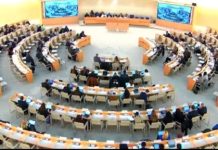By Kebba JEFFANG
Gambian President Adama Barrow, has signed five United Nations Treaties on Thursday September 20th while attending the 72nd United Nations General Assembly meeting, taking place in the United States. Included among them is the abolition of death penalty in the country.
The signed treaties are: the abolition of the Death Penalty as part of the Second Optional Protocol to the International Covenant on
Civil and Political Rights; 
International Convention on the Protection of the Rights of All Migrant Workers and Members of their Families;
the International Convention for the Protection of All Persons from Enforced Disappearance;
the United Nations Convention on Transparency in Treaty-Based Investor-State Arbitration and the Treaty on the Prohibition of Nuclear Weapons.
By signing the Treaties, the New Gambia continues to promote democracy and show the commitment of the state to protect the lives of political activists. This will remove fear and promote the rule of law for citizens to express their civil and political rights. The signing is a commitment on member states of the United Nations to prohibit execution and totally abolish the Death Penalty.
The Gambia is one of the countries with high migration rate but also receives immigrants from other African countries. Thus the importance of protecting the dignity of all migrants. It agrees to protect the human rights of migrant workers and families.
Citizens have been subjected to enforced disappearance. It is commendable for The Gambia to agree to prevent enforced disappearance defined in international law, not only at home but throughout the UN member states.
Setting international rules for investor-state arbitration is strategic, as the world is increasingly dependent on investment for development of communities. Consent to apply the sets of Rules on Transparency in Treaty-based Investor-State Arbitration, will provide mechanisms for recording such agreement and shall come into force as of 18th October this year. It intends to minimize criminal acts and economic exploitation.
The Gambia intends to prevent mass destruction of human life and property to promote peaceful co-existence in the world. The signing of the Treaty on the Prohibition of Nuclear Weapons, or the Nuclear Weapon Ban Treaty will strengthen that commitment.
The Gambia will now work to move from signing to ratification and domestication of the signed treaties, to make them effective in the country.
Meanwhile, in separate engagements, President Barrow continued to hold meetings and network with his colleagues and businesses. On Wednesday morning along with other invited Heads of States, the president attended a business meeting with Bloomberg at the Plaza Hotel in New York.
President Barrow held a private meeting with the Prime Minister of Belgium, and shook hands with many of his fellow Heads of States, attending the UNGA.
In the afternoon of the same day, President. Barrow met International Criminal Court (ICC) Chief Prosecutor Fatou Bensouda, and her team for a briefing on the organization’s work. She called for support from African countries to understand the Rome Statue as members. Madam Bensouda welcomed The Gambia’s return to the ICC and said the withdrawal from the world body by the former regime, was not effective due to the time required for it to come into effect.
On the side lines of the UNGA, the Gambian leader attended the African Union meeting held at the Economic and Social Council hall of the UN on the theme: Global partnership towards harnessing the Demographic Dividend in Africa, Focus on Education and Skills Development, Employment and Empowerment of the youth. He was accompanied by the Minister of Foreign Affairs.
The President met several delegates, potential investors and philanthropists, who expressed interest to explore the potentials on what the Gambia offers.
Ms. Isatou Jallow, a Gambian lawyer fighting for the rights of disabled people, presented her work to President Barrow. She volunteered to contribute to the review of the bill on people with disabilities and expressed her interest to support the education of children with disabilities. Justice Minister Abubacarr Tambadou informed Ms. Jallow that the proposed bill would be tabled at the National Assembly for enactment. The Minister of Foreign Affairs, Mr. Ousainou Darboe and Ambassador Momodou Taggara attended the meeting.
In her separate engagement, the First Lady, Fatou Bah-Barrow attended a luncheon and reception held in honour of First Ladies attending the UNGA, hosted by America’s First Lady, Mrs Melania Trump and Canadian Prime Minister Ms Sophie Gregory Trudeau respectively.



















